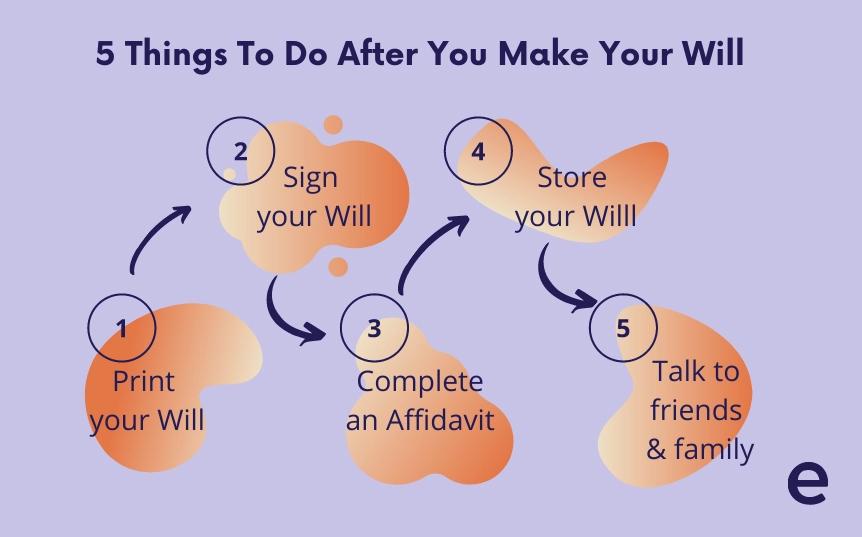Congrats, You Made A Will! Now What?

So, you finally got around to creating your Will. First off, congratulations 🎉! You’re well on your way to being more prepared than over half of Canadians when it comes to future planning.
But the work doesn’t end here. Estate planning documents are not legally valid until they’ve been printed and signed with ink.
I repeat, if you don’t print and sign your Will, it’s basically the same thing as not having one at all.
Here are the steps everyone should follow after making a Will to make sure their loved ones are always protected.
1. Print your Will
Digital copies are great for family photos and cell phone bills, but they just don’t work when it comes to your Will. Printing a physical copy of your Will is absolutely necessary, and is the first step to making sure that your Will is going to be valid.
No printer? No problem! If you’ve created your Will with Epilogue, we can even print your documents and mail them straight to your door.
2. Sign your Will with witnesses
For a Will to be valid, it must be signed in a very particular way. For starters, you need to find two people who will witness you sign your Will. But it's important to know that certain people should not be your witnesses.
Who should not act as a witness
Anyone who is incapable or under the age of majority in your province
A beneficiary named in the Will — that is, anyone who will receive anything under the Will
Any potential beneficiary — that is, anyone who might possibly receive anything under the Will (such as a child of a beneficiary)
The spouse or partner of a beneficiary or potential beneficiary
Anyone else who may be named in the Will (e.g. an executor or guardian)
Friends, neighbours, or colleagues are often good choices as witnesses since they usually aren't beneficiaries.
With both of your witnesses present at the same time, you can proceed to sign your Will and have each of your witnesses sign too. It is vital that you only sign one copy of your Will.
Watch Epilogue co-founders, Arin Klug and Daniel Goldgut, chat more about the necessary steps you need to take to properly execute your Will:
If you’ve created your Will with Epilogue, you’ll get a complete set of signing instructions that explain where everything needs to be signed, dated, and initialed to make your Will official.
3. Have one witness complete an Affidavit or Proof of Will
If you and your witnesses have signed your Will, then you're on the right track. Your Will is now legally valid. But remember — you made a Will to make things easier for your loved ones when you are no longer here. And that's why completing this next step is really important.
After a person dies, their Will usually has to go through a process called probate. Probate is the process through which a court authenticates a Will and confirms that the executor has the authority to act on behalf of the deceased's estate.
In most provinces, when a Will is submitted for probate, the court requires evidence that all of the proper procedures were followed when the Will was signed.
In Ontario, the evidence that the court wants to see is an Affidavit of Execution.
In Alberta, it's the NC 8 Form–Affidavit of Witness to a Will.
In Saskatchewan, it's Form 16-19A –Affidavit of Execution of Will.
In Manitoba, it's Form 74F - Affidavit of Execution of Will or Codicil.
In Nova Scotia, it's Form 2 - Affidavit of Execution of Will or Codicil.
In PEI, it's Form 65F - Proof of Will.
In Newfoundland and Labrador, it's Form 56.11A
- Proof of Will
In New Brunswick, it's Form 2I - Affidavit of Execution of a Will
In BC, an affidavit is not required, but it is recommended to register the location of your Will with the BC Vital Statistics Agency.
What are Affidavits?
The Affidavits are written statements that are sworn or affirmed by one of the witnesses in front of a commissioner of oaths — someone who is legally authorized to administer an affidavit, such as a lawyer or notary public. The witness and the commissioner of oaths will sign the Affidavits, which must be physically attached to the original Will.
The best time to have one of your witnesses sign the Affidavit is shortly after the Will has been signed. If someone dies and there is no Affidavit attached to the Will, the probate process will take longer and can be much more costly for the family.
There are many notary services throughout the province where your witness can go to swear/affirm the Affidavit of Execution in front of a commissioner of oaths. In most jurisdictions, Affidavits can even be commissioned remotely.
If you complete your Will with Epilogue, a blank Affidavit document or Proof of Will form will be included with your Will. There are many notary services throughout the province where your witness can go to swear/affirm the Affidavit of Execution in front of a commissioner of oaths. In most provinces, Affidavits of Execution can even be commissioned remotely.
4. Store your Will somewhere safe
The thought of printing and storing physical documents may seem antiquated. We aren’t used to storing physical documents for long periods these days. But you'll need to store the original, physical copy of your Will (with the completed Affidavit attached) somewhere that’s safe but accessible.
You can make digital or physical copies to send to trusted friends or family members, but the one originally-signed copy of your Will is the only one that is going to be accepted as your legal Will. For this reason, you should store your original Will in a safe place where your executor can access it if needed.
Lots of people decide to store their Will in their home — like in a safe or locked cabinet. If you choose to do something like that, make sure you’re not the only person that knows the combination or has the key. It’s also a good idea to make sure whatever you use to store your Will in is fireproof and waterproof (you know… just in case.)
Make sure your executor knows where your Will is should they need to access it at any time. You don’t want them going on a wild goose chase to find it!
It may seem counter-intuitive, but do not store your Will in a safety deposit box. A safety deposit box may be a good place to store some of your important documents. But if you’re not alive, the bank won’t let anyone access it.
5. Talk to your friends and family about your wishes.
This is probably the hardest step. Your death is perhaps the last thing you or your loved ones want to talk about — but it’s so important to have these conversations while you still can.
For practical reasons, people have to know where your Will is stored and how to access it, especially your executor.
If you have young kids, you’ll want to appoint a guardian. Make sure your guardian knows they have this role and feels comfortable with it. Some people have specific wishes regarding how they want their kids raised if they’re not around. If there’s anything you want the person you’ve chosen as their guardian to know about your kids, be sure to tell them.
Finally, you may have specific wishes about things like organ donation or whether you want to be buried or cremated. As hard as it is, it’s important to have these conversations with the people that are closest to you so they know.

What about signing my Powers of Attorney?
Planning for incapacity is an important part of a comprehensive estate plan. Across Canadian provinces, these documents go by different names. Planning for incapacity refers to the legal documents that set out who you want to make decisions on your behalf if you are ever unable to make those decisions for yourself.
There are two types of "incapacity documents" that people commonly create at the same time they create a Will.
In Ontario, it's a Power of Attorney for Property and a Power of Attorney for Personal Care.
In Alberta and Nova Scotia, it's an Enduring Power of Attorney and a Personal Directive.
In BC, it's an Enduring Power of Attorney and a Representation Agreement.
In Saskatchewan, Manitoba and PEI, and Newfoundland it's an Enduring Power of Attorney and a Health Care Directive.
In New Brunswick, it's an Enduring Power of Attorney and Power of Attorney of Personal Care.
Read more about the differences between them here.
These incapacity documents are different from Wills because they operate when you are still alive, but don’t have the mental capacity of making decisions for yourself. A Will only takes effect after you pass away, as it outlines what you wish to happen when you’re no longer here.
If you've used Epilogue to help you create your incapacity documents, they will each come with a detailed set of signing instructions that will need to be followed to ensure that they are valid.
Closing thoughts
Making your Will is a fantastic step toward responsible future planning — but just making a Will isn’t going to help unless you take steps to make it legally binding. Make your estate planning documents official by printing them out and having them signed and witnessed.
Beyond that, make sure one of your witnesses swears/affirms an Affidavit of Execution with a commissioner of oaths to make sure the probate process will be smooth. Once that's all done keep your Will stored safely and think about how to approach some potentially uncomfortable conversations with your loved ones. In the long run, these conversations will give you peace of mind knowing you've saved your friends and family a world of hurt and stress down the road.
And if you’ve already created your Will and POAs with Epilogue, thank you for trusting us with your estate planning! ❤️










